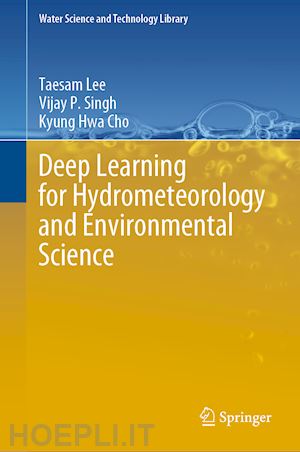

Questo prodotto usufruisce delle SPEDIZIONI GRATIS
selezionando l'opzione Corriere Veloce in fase di ordine.
Pagabile anche con Carta della cultura giovani e del merito, 18App Bonus Cultura e Carta del Docente
This book provides a step-by-step methodology and derivation of deep learning algorithms as Long Short-Term Memory (LSTM) and Convolution Neural Network (CNN), especially for estimating parameters, with back-propagation as well as examples with real datasets of hydrometeorology (e.g. streamflow and temperature) and environmental science (e.g. water quality).
Deep learning is known as part of machine learning methodology based on the artificial neural network. Increasing data availability and computing power enhance applications of deep learning to hydrometeorological and environmental fields. However, books that specifically focus on applications to these fields are limited.
Most of deep learning books demonstrate theoretical backgrounds and mathematics. However, examples with real data and step-by-step explanations to understand the algorithms in hydrometeorology and environmental science are very rare.
This book focuses on the explanation of deep learning techniques and their applications to hydrometeorological and environmental studies with real hydrological and environmental data. This book covers the major deep learning algorithms as Long Short-Term Memory (LSTM) and Convolution Neural Network (CNN) as well as the conventional artificial neural network model.
Professor V.P. Singh is a University Distinguished Professor, a Regents Professor, and Caroline and William N. Lehrer Distinguished Chair in Water Engineering at Texas A&M University. He received his B.S., M.S., Ph.D. and D.Sc. degrees in engineering. He is a registered professional engineer, a registered professional hydrologist, and an Honorarydiplomate of ASCE-AAWRE. He has published more than 1270 journal articles; 30 textbooks; 70 edited reference books; 105 book chapters; and 315 conference papers in the area of hydrology and water resources. He has received more than 90 national and international awards, including three honorary doctorates. He is a member of 11 international science/engineering academies. He has served as President of the American Institute of Hydrology (AIH), Chair of Watershed Council of American Society of Civil Engineers, and is currently President-Elect of American Academy of Water Resources Engineers. He has served/serves as editor-in-chief of three journals and two book series and serves on editorial boards of more than 25 journals and three book series.
Professor Kyung Hwa Cho, Ph.D. is an associate professor in the urban and environmental at Ulsan National Institute of Science and Technology, South Korea. He obtained his B.S in chemical engineering and M.S. and Ph.D. in Environmental Engineering. He has published more than 110 journal articles in water and environmental journals such as Water Research, Remote Sensing of Environment. His expertise lies in modeling water quality, deep learning application for water quality prediction, and using hyperspectral images for water quality monitoring.










Il sito utilizza cookie ed altri strumenti di tracciamento che raccolgono informazioni dal dispositivo dell’utente. Oltre ai cookie tecnici ed analitici aggregati, strettamente necessari per il funzionamento di questo sito web, previo consenso dell’utente possono essere installati cookie di profilazione e marketing e cookie dei social media. Cliccando su “Accetto tutti i cookie” saranno attivate tutte le categorie di cookie. Per accettare solo deterninate categorie di cookie, cliccare invece su “Impostazioni cookie”. Chiudendo il banner o continuando a navigare saranno installati solo cookie tecnici. Per maggiori dettagli, consultare la Cookie Policy.